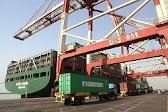According to Pakistan’s leading English newspaper, Dawn, Baluchistan
Awami Party (BAP) Senator Anwaarul Haq Kakar has been chosen as the interim
prime minister of Pakistan. His job is to keep the country running until a new
government is elected.
The much awaited announcement came after Prime Minister
Shehbaz Sharif and outgoing Opposition Leader in the National Assembly (NA)
Raja Riaz reached a consensus over Kakar’s name for the coveted post during a
meeting in Islamabad today.
Subsequently, the two leaders sent an advice regarding
Kakar’s appointment as the caretaker prime minister to President Arif Alvi, who
shortly afterwards accorded his assent.
“President Dr Arif Alvi has approved the appointment of
Anwaarul Haq Kakar as caretaker prime minister. The president approved the
appointment under Article 224-A of the Constitution,” a statement by the
Aiwan-e-Sadr said.
Earlier, in a media talk outside the Prime Minister’s House
after meeting PM Shehbaz, Riaz also confirmed that Kakar had been picked to
head the interim set-up.
“We had earlier decided that the caretaker PM should be
someone from a smaller province and a non-controversial personality. Our aim
was to remove the sense of deprivation in small provinces.
“We have finally reached a consensus that Anwaarul Haq Kakar
will be the caretaker PM,” Riaz said.
“I had given this name and the PM has consented to this name
… I and the PM have signed on the summary,” he told reporters, adding Kakar
would be sworn in on Sunday.
Anwaarul Haq Kakar was elected as an independent senator
from Baluchistan in 2018, clinching a six-year term that will conclude in March
2024.
Simultaneously, he worked as chairperson of the Senate
Standing Committee on Overseas Pakistanis and Human Resource Development, and
as a member of the Business Advisory Committee, Finance and Revenue, Foreign
Affairs and Science and Technology.
Kakar also undertook the role of parliamentary leader for
the Baluchistan Awami Party — formed in 2018 — within the Senate.
Kakar navigated this leadership position for considerable
five-year duration. Nonetheless, a mere five months ago, the party resolved to
opt for new leadership, leading to his replacement.
He also served as the spokesperson for the Baluchistan
government from December 2015 to January 2018.
According to the Centre for Strategic and Contemporary
Research (CSCR), an Islamabad-based research institute, Kakar holds a bachelor’s
degree in political science and sociology from the University of Baluchistan.
The institute also mentioned Kakar’s proficiency in English,
Urdu, Persian, Pushto, Balochi, and Brahvi languages.
Reacting to the development, former information minister and
ex-PTI leader Fawad Chaudhry said Kakar was an “honest, educated and modest”
Pakistani.
“After a long time, some good news has come for Pakistan.
May God be your supporter and bless this decision for Pakistan,” he said on X,
formerly known as Twitter.
PPP leader Faisal Karim Kundi welcomed the development and
congratulated Kakar. “PPP left it to PM Shehbaz to nominate the caretaker prime
minister with the consultation of opposition leader.
“Hope under his leadership Election Commission will conduct
free and fair elections,” he added.
Contrary to his colleague Kundi, PPP’s Khursheed Shah
opposed Kakar’s selection and said, “We were not aware that Anwaarul Haq’s name
will be finalized, and it would have been better if another person was selected
for the post.”
However, he added, “Anwaarul Haq Kakar would be remembered
if he succeeds in ensuring transparent elections.
Shah told Dawn.com over the phone that the PPP had
proposed five names for the interim PM, which did not include Kakar. He shared
four names he said were recommended by the PPP — Salim Abbas Jilani, Jalil
Abbas Jilani, Muhammad Malik and Afzal Khan.
“Whoever proposed his (Kakar) name, we should hope for
good,” the PPP leader said.
PTI Senator Ali Zafar said Kakar is an “intelligent,
articulate [and] reasonable man”.
“[He] believes in politics of cooperation not confrontation:
has always well represented the interests of Baluchistan [sic]. Wish him the
best,” he tweeted.
Separately, Bloomberg quoted political
commentator Hasan Askari Rizvi as saying that Kakar’s true test would be
whether he follows the IMF’s approach and conducts inclusive elections
involving all political parties.
He separately told AFP that Kakar has a limited
political career and not much weight in Pakistani politics, but that could work
in his favour.
“This can be an advantage because he has no strong
affiliation with the major political parties,” he said.
“But the disadvantage is that being a lightweight politician
he may find it difficult to cope with the problems he’s going to face without
the active support of the military establishment.”
Sources said PML-N supremo Nawaz Sharif was insisting,
through PM Shehbaz Sharif, on former finance minister Ishaq Dar to be picked as
caretaker premier, and if not Dar, then former prime minister Shahid Khaqan
Abbasi.
However, Riaz, a PTI dissident with no backing of a political
party, was getting dictation from another power corridor and insisting on the
name of Senate Chairman Sadiq Sanjrani, sources claimed. Sanjrani called on
Riaz on Friday, as well as Dar and Ahsan Iqbal.






